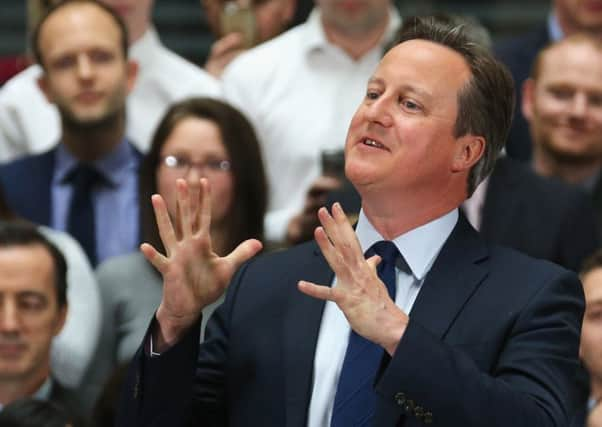Leaders: Cameron may never have it so good again


EVENTS, dear boy, events. Harold Macmillan’s reputed retort when asked what can derail a government is as over-used as Harold Wilson’s “a week is a long time in politics” but while we may grow weary of hearing it recited, the fact is that the observation remains relevant because Macmillan’s assessment was spot on (if indeed he did ever utter the words, which is a matter of dispute).
Both Macmillan and Wilson’s remarks would be appropriate for their contemporary successor today. A week ago, David Cameron had his focus firmly set on achieving a “stay” majority in the forthcoming EU referendum, and although he had little reason to be overly confident about the eventual outcome in June, he appeared to be heading in the right direction.
Advertisement
Hide AdAdvertisement
Hide AdThe week has ended with calls for the Prime Minister to be removed from office following the exposure of a scandal which has put his financial affairs under an unprecedented level of scrutiny. The Panama Papers exposé could yet turn out to the perfect storm for Mr Cameron.
In truth, it is not a resignation matter. There is no evidence, so far, of the Prime Minister wilfully pursuing tax avoidance or tax evasion for personal gain. From the information available at this stage, the profit made from his purchase and sale of shares in an offshore trust, set up by his late father, met all UK tax requirements. Had it not, he would likely have found that his previously stated intention to stand down from his role during the course of this parliament would have come sooner than planned.
As any personal financial adviser will tell us, investments are all about attitude to risk, and Mr Cameron is no stranger to taking a gamble. He took a risk when he agreed to a referendum on Scottish independence, clearly believing that there was no appetite for a breakaway then finding that the matter was nowhere near as clear cut as he had thought. A swing of 200,000 votes in 2014 from No to Yes would have seen him preside over the break-up of Britain, removing him from office.
He has gambled again with an EU referendum, believing there is enough support for an “In” vote to silence the rebels in his own party and put the matter to rest. It was a bold but plausible strategy, but after the past week, it looks a path fraught with danger. Mr Cameron has to move fast to get back on the front foot, but can he? His reluctance to admit his offshore trust investment this week shows him to be evasive. If his dealings were legal, what did he hope to achieve by failing to disclose them?
Labour politicians have taken every opportunity to make political capital out of Mr Cameron’s discomfort, and well they might. However, they have to remember the long game as well. The Labour leadership does not want to exit the EU, and pushing Mr Cameron out the door could be enough to turn the EU referendum against them.
For Jeremy Corbyn & Co, there is another popular saying in politics: be careful what you wish for.
It’s enough to drive you to drink
Although no-one is pretending that Scotland has rid itself of a damaging drink problem, it is depressing that a decision to allow the sale of alcohol at a motorway service station is considered to be controversial.
A new Marks & Spencer outlet on the M9 at Bannockburn has been granted a licence, and the store is not even a first in Scotland to be given this right. Members of Stirling Licensing Board heard during deliberations that a similar licence has already been granted to an M&S store situated at services on the M90 at Kinross.
Advertisement
Hide AdAdvertisement
Hide AdIn the push to keep alcohol consumption under control and prevent damage to the nation’s health, it is sometimes forgotten that alcohol is freely available in a variety of outlets across the country. Any motorist looking to make a purchase will not be deterred by a lack of availability at a service station. And increasingly, service stations are turning into mini shopping centres. We can buy anything from garden tools to groceries to home furnishings, and we might even fill up the tank at the same time. Why prevent someone from buying alcohol while there?
If outdoor seated areas at service stations were to become beer gardens, there would be good reason for concern, but the M&S licence has been granted on the basis that conditions were agreed to prevent consumption of alcohol within the premises or the wider service area. The unlikely idea that these places would be great hang-outs for a drinking session has been taken into account, just in case.
There are obvious reasons for preventing the sale of alcohol in certain places and at certain times. But denying its sale at a service station is condescending and unnecessary.